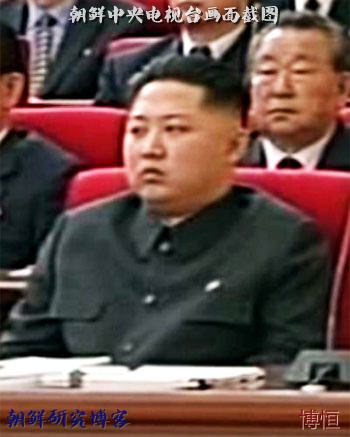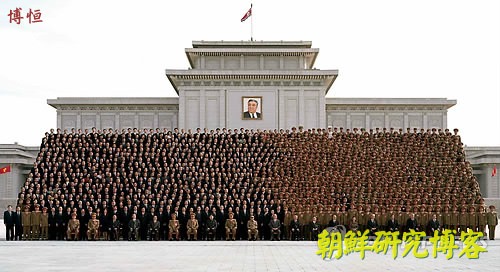So now it’s official. North Korea’s ruling party has given its blessing to Kim Jong Il’s choice of a successor. The lucky man is Kim’s third and youngest son, Kim Jong Un. On September 28 a special conference of the Korean Workers’ Party named the heir to the party’s Central Committee and also appointed him to a position as vice-chairman of the party’s Central Military Commission. Just for good measure Kim Jong Un also earned a promotion to four-star general (pretty impressive for someone who’s never actually served in the military).
It should go without saying that we don’t know a great deal about Kim the Younger. Even these days, when we actually do know quite a bit about conditions inside the Democratic People’s Republic of Korea, it’s still almost impossible to penetrate the inner workings of its leadership. We know that Kim Jong Un is probably in his twenties. We know—courtesy of the Japanese chef who used to make Kim Jong Il’s sushi—that he’s a basketball fan. We know that he attended a Swiss boarding school.
This last detail is likely to awaken hope. Surely, one might think, his years spent in the West will have made North Korea’s future ruler painfully aware of just how backward his country is. That, combined with Kim the Third’s youth and comparative vitality, could in theory place him in a position to take an interest in the reforms his country desperately needs: North Korea still ranks at the bottom of virtually every list on economic performance and political freedoms. Most North Koreans continue to suffer from malnutrition. Last year, despite the regime’s long history of harsh treatment of its own people, some North Koreans actually took part in public protests against a botched currency reform.
So does Kim Jong Un’s appointment offer grounds for optimism? Not really. In fact, the peculiar circumstances of North Korea’s situation make any reform scenario highly unlikely. First, that Kim Jong Il has finally managed to seal his son’s claim to the throne merely serves as a reminder of the difficulties of the transition that the North still faces. Kim Senior is known to be in poor health, and many indications suggest that it’s the prospect of his looming mortality that has forced him to formalize his son’s claim to power despite Kim Jong Un’s conspicuous lack of experience. The fact that the current Party Conference was originally announced for an earlier date, then postponed, strongly suggests that the process hasn’t been as smooth as Kim Jong Il would have hoped. Kim’s sister, Kim Kyong Hee, who has long been a kind of coordinator for her brother’s private life, also received a promotion to the rank of four-star general this week, and her husband, Chang Song Taek is already the de facto number two in the regime. (In 2004 he was purged and sent away for re-education, but he has since been restored to power, though tensions may still remain).
As a result, some North Korea-watchers speak of a potential “regency” that is likely to dominate Kim Jong Un even if he ever manages to ascend to the top job. If there any big changes in North Korea’s future, they’re likely to come from disunity and rivalry within the Kim Jong Il family and leadership elite, rather than a future leader’s conscious decision to improve things. But, of course, we don’t know. It will be worth keeping on eye on the composition of the National Defense Commission, the body (not to be confused with the one in which Kim Jong Un just moved up) that actually makes the important decisions in North Korea’s “military-first” regime. If Kim Jong Un joins it, that could mean he’s cementing his power. If he doesn’t, that probably means that he’s still under the wing of his powerful aunt and uncle.
Meanwhile, the biggest constraint on any North Korean leader’s reformist aspirations remains firmly in place: the existence of South Korea. It is highly unlikely that any economic modernizer in Pyongyang would be able to open up his (or her) economy to market forces without allowing investment to flow in from the South—and once that begins, it’s hard to imagine how anyone in the North could go on claiming that they still have the better system. (In this respect, at least, the fate of post-Wall East Germany provides an illuminating precedent.)
Advertisement
Finally, no one should expect Kim Junior to embrace a liberal course just because he’s lived in the West. The fact that he appreciates just how far his compatriots’ living conditions lag behind the rest of the world’s is just as likely to make him appreciate the fundamental weakness of the Kim Family Regime—which could make him less inclined to loosen up. Just because someone’s lived in the West doesn’t automatically make him a liberal. Pol Pot, the architect of Cambodia’s genocide, studied in France. Sayid Qutb, the father of Al Qaeda-style Islamism, railed about the presumed horrors of American life after doing a stint as an exchange student in Greeley, Colorado. If it were really true that travel broadens, North Koreans might rightfully expect to see a more enlightened form of leadership after their present leader fades from the scene. But this seems too much to expect.




